Items
topic_interest is exactly
anxiety
-
 2024-05-20
2024-05-20Walk With Me Surving Covid
This book takes you on Tracys journey as a COVID survivor through a traumatic experience. She is faced with losing her independence, having to rely on others, and letting go of a love she thought she wanted only to find the real love she needed. Tracy shares how she copes with depression and PTSD and lives and functions with it daily. This book is a powerful testimonial from a truly strong woman who shares how her faith was her strength -
2024-05-07
Life Before and After COVID-19
Before COVID-19, no one thought twice about social interactions. After COVD-19 that's all people were thinking about. Something that was so normal and mindless became the one thing that people were afraid of. After lockdown was over, many people had social anxiety because they went form not seeing anyone to seeing everyone. People were so afraid of catching COVID-19 that they chose to be alone rather than live their life and make memories. Coming back to school after lockdown was so scary. I was so used to not having to see anyone or care about what anyone thinks because we had class from home. Seeing all these people, made me so self conscious of what people think and how to behave normally. It was almost as if I had never talked to people in my life. Even now in 2024, people don't interact in the same as before. It's more normal than ever to see people wearing masks. I feel that this is the new normal and we are probably never going back to how it was before COVID-19. -
0012-03-20
The Day the World Changed
On March 12th, 2020, I found out the fate of the remainder of my first spring semester as a college student. I don’t remember much about days during quarantine, but I do remember specific details of this day. It was the week before Spring Break for UAB, and all students were preparing for a week off from school. That weekend, my family was planning a trip to New Orleans for the weekend as my mother’s employer offered her a free two-night stay at any hotel of her choosing. My dad and I were planning to finally visit the National World War Two Museum. As my friend and I were walking to dinner at a local poke place in Five Points South, I received my first email that my English class would remain virtual for the remainder of the semester. My professor had Type 1 Diabetes and did not want to risk his health. Shortly after, the entire student body of UAB received an email that students would not return to campus until April 1st, 2020, at the earliest. While some students decided to pack up all of their belongings and take them home with them, others truly believed we would be coming back on April 1st. I decided not to take my belongings with me and traveled four hours to my hometown for the extended break. I went home that Friday, March 13th, 2020, after taking my midterm for Biological Anthropology. Once I arrived home, my parents made the decision to cancel our trip as the spread of COVID-19 was unknown at this time, and they did not want to risk going to a public and crowded place like New Orleans. Instead, my father and I traveled four hours back to Birmingham to pack up my dorm room and bring my belongings home. At this time UAB had completely shut down and was limiting access to campus and the dorms. They only allowed me 15 minutes to get any belongings needed. After that trip, UAB officially closed for the remainder of the term and students belongings were moved out of the dorms by moving companies to make room for healthcare workers. We did not get the chance to go on our New Orleans trip until over two years later, in 2022. I planned a big trip for my 21st birthday with my friends and family. While most restrictions have been lifted, people were still wearing masks, and businesses were still enforcing the three- to six-foot social distancing. I wasn’t surprised, as just earlier in the year, my employer required face masks for the spike in COVID cases in Birmingham. I remember going to restaurants and we were required to wait outside for our table. In the National World War Two museum, there were stickers on the floor that represented how far we should stand from each other. While many of the restrictions, including the social distancing and wearing a mask, had been lifted, it was nice to see that people were still making it a point to follow them for the safety of themselves and others. -
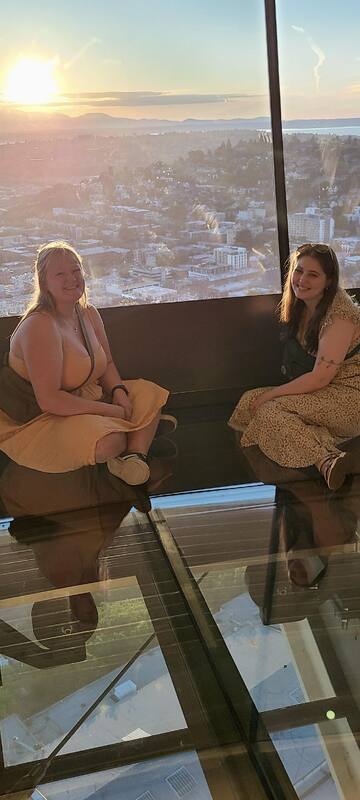 2023-07-13
2023-07-13Post-Pandemic Trip to Seattle
Like it did for many people, the start of the Covid-19 pandemic canceled multiple travel plans for me. I applied for my passport in 2018 with the intention of going on a study-abroad trip my junior year of undergrad. Instead of travel memories, I have a memory of sitting in my PoliSci class and discussing the news with my classmates that the university might shut down for a few days. We didn’t go back, and I still haven’t used the passport. Once travel restrictions were lifted it still took me a while to get back out into the world. The first trip I took was in July of 2023. I traveled from Minnesota to Seattle, Washington with some of my friends from high school for a week of sightseeing. We chose it because most of us had never been to the Pacific Northwest. It was my first time in an airport since December of 2018. I remember having quite a few lingering anxieties related to Covid, to the point where I was actually dreading the trip before we left (even though I ended up having a wonderful time). I had some struggles with health anxiety during the pandemic. Before tests were widely available I remember frequently being so paranoid I had Covid that I would convince myself I did and actually make myself feel sick with anxiety. Since restrictions have been lifted this has stuck around, and now takes the form of me getting excessively anxious about getting Covid before important events (like the trip, and my wedding just a few weeks before it). I also was nervous about going to the airport because I didn’t know what to expect in regards to how many restrictions would still be in place. It turned out there were no restrictions remaining in the MSP or SeaTac airports beyond some signs reminding people to not enter if they felt unwell (I am certain most people who make it far enough to see the sign still enter). Once the actual boarding of the plane went fine, I entertained myself with anxieties about the odds of someone on the plane having Covid and all of us breathing circulated air. I actually had Covid once in the fall before the trip, and got the highest fever of my life but was ultimately okay. Interestingly, this didn’t really ease my fears during the flight. Nobody got Covid from the Seattle trip (though we were probably just lucky) and instead I got some of the most precious memories of my life so far. I also had a surprising lack of anxiety once we got there. We visited a long list of places including most notably the Space Needle, Chihuly Garden and Glass Museum, Seattle Aquarium, Pike Place Market, and the National Nordic Museum. There were no Covid-19 restrictions remaining in any of these places. I had packed one reusable mask in my backpack in case I needed it, and it turned out the one time on the whole trip that I entered a space where masks were required (a small independent bookstore) I didn’t have it with me and had to borrow one. I still thought about Covid every time we pushed through a packed crowd in Pike Place Market, but more so than being afraid I thought about how during the peak of the pandemic I was convinced it was something I would never do again. I don't believe the pandemic is truly over even now, but I drastically felt how much things had changed in that moment. The picture I included to tell my story is of my friend Carlie and I on the top of the Space Needle (I am sitting on the right). We went back twice, and spent literally hours sitting on the glass floor and watching the city go by as it slowly rotated. It's one of my fondest memories of the trip. I’ve heard some people say the Space Needle is overrated, but as small-town Midwesterners we were pretty fascinated. I’m grateful to those who spent the pandemic under harsher restrictions in bigger cities like Seattle so that I can visit these places now. It was nice to feel so small looking down on Seattle after the world felt so small during restrictions just a few years earlier. -
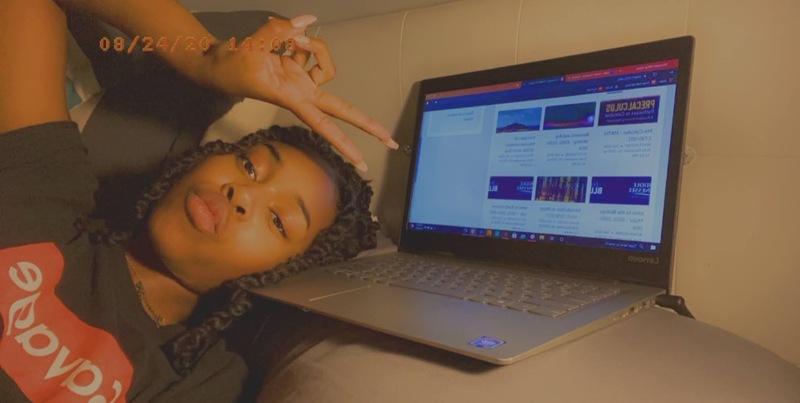 2020-08-24
2020-08-24First Day of School Picture
The picture I chose to add to the archive is my first day of school on August 24, 2020. In this picture, I was laying in bed with my laptop because everything was online. If you were lucky, you got a professor that taught class on Zoom. That is the closest to being in a regular classroom as it got. You were able to see your classmates (if they turned their camera on), you could have discussions with everyone, ask the professor questions and get immediate answers. On the other hand, you could get stuck with a professor who chose to use youtube videos and websites instead of teaching. These were the worst, poor to almost no teacher-student interaction, just discussion boards and Google. It was impossible for me to learn like this, I felt like I was not being taught! It was always stressful when trying to do assignments for classes like this because I did not understand the curriculum. If I needed to contact my professor, I just had to send an email and hope they would email me back soon with answers. Sometimes, I would not get a response until days later, a few times I never got a response. After a while of this, I started to feel miserable, stressed, and depressed. My grades started getting lower and lower and knowing how much school costs, knowing that I was going to lose my grants and scholarships because I was failing, I started having anxiety attacks. In my head, I kept saying, “I cannot learn like this, I know I am going to fail, so why keep trying?” Things got to a point where I would open my laptop, look at my assignments, cry, and then just close my laptop back up. I lost all my motivation and I lost sight of my dreams to be an optometrist. I remember the day that I dropped out, the defeat that I felt, feeling like a complete failure. -
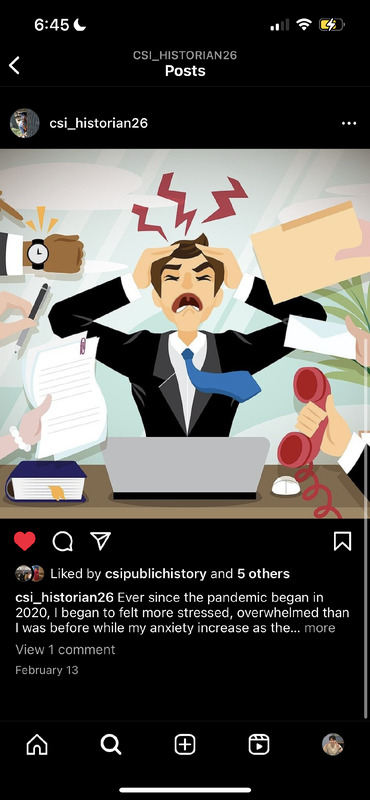 February 13th, 2023
February 13th, 2023Status of Mental Health During Lockdown
I was overwhelmed and stress when we went to online classes. The photo I posted is a representation of how I felt during that time -
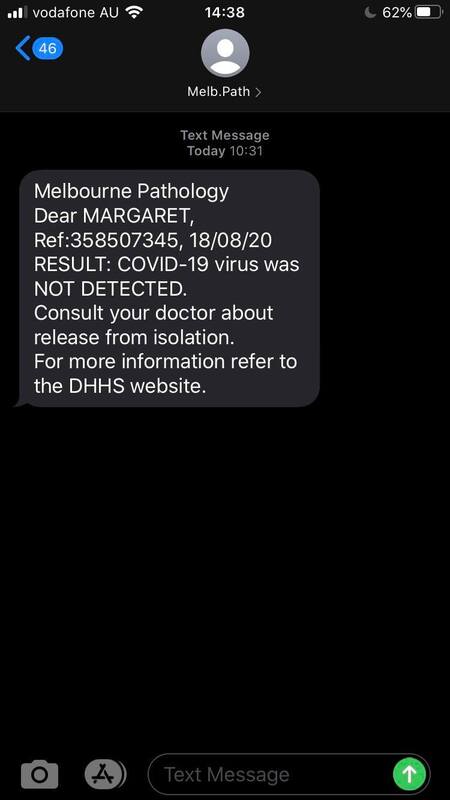 2020-08-18
2020-08-18HIST30060: Negative Test Result
This is a screenshot of a negative PCR test result from August 2020. At this time, test results would typically take 24 hours to process, with the government requiring that the patient isolate until they received the result of their test. I, like most residents in Melbourne, suffered a profound emotional impact from the bombardment of public messaging about the pandemic. The advertising campaigns by the state government as well as opinions expressed on social media suggested that a failure to follow health protocols would result in tremendous negative effects. For example, failing to get tested could be the reason that someone's grandmother died from exposure to the pandemic. With such high stakes attached to my everyday behaviour and compliance to health orders, whenever I felt even slightly unwell, it would trigger a barrage of intense anxiety. The health order to self-isolate for a week after a positive test result, as well as the Andrews governments' policy of reopening contingent on the number of positive test results in the community, further increased anxiety around any form of cold symptoms. To the day, this image evokes feelings of fear and relief. Something so mundane as a text message represented either a ticket to freedom or a binding health order. In this case, the text message represented a reassurance that my sickness was the regular, boring sort, and that I was not an accidental killer of grandmothers. It represents the use of everyday technology, both sophisticated and mundane, in the pandemic response. -
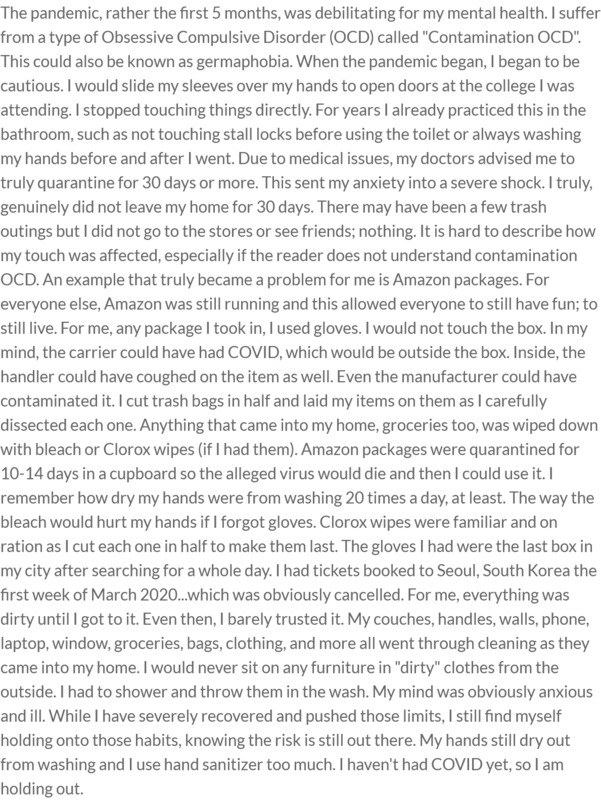 2020-03-05
2020-03-05Germs and Touch: Contact OCD during the pandemic
The pandemic, rather the first 5 months, was debilitating for my mental health. I suffer from a type of Obsessive Compulsive Disorder (OCD) called "Contamination OCD". This could also be known as germaphobia. When the pandemic began, I began to be cautious. I would slide my sleeves over my hands to open doors at the college I was attending. I stopped touching things directly. For years I already practiced this in the bathroom, such as not touching stall locks before using the toilet or always washing my hands before and after I went. Due to medical issues, my doctors advised me to truly quarantine for 30 days or more. This sent my anxiety into a severe shock. I truly, genuinely did not leave my home for 30 days. There may have been a few trash outings but I did not go to the stores or see friends; nothing. It is hard to describe how my touch was affected, especially if the reader does not understand contamination OCD. An example that truly became a problem for me is Amazon packages. For everyone else, Amazon was still running and this allowed everyone to still have fun; to still live. For me, any package I took in, I used gloves. I would not touch the box. In my mind, the carrier could have had COVID, which would be outside the box. Inside, the handler could have coughed on the item as well. Even the manufacturer could have contaminated it. I cut trash bags in half and laid my items on them as I carefully dissected each one. Anything that came into my home, groceries too, was wiped down with bleach or Clorox wipes (if I had them). Amazon packages were quarantined for 10-14 days in a cupboard so the alleged virus would die and then I could use it. I remember how dry my hands were from washing 20 times a day, at least. The way the bleach would hurt my hands if I forgot gloves. Clorox wipes were familiar and on ration as I cut each one in half to make them last. The gloves I had were the last box in my city after searching for a whole day. I had tickets booked to Seoul, South Korea the first week of March 2020...which was obviously cancelled. For me, everything was dirty until I got to it. Even then, I barely trusted it. My couches, handles, walls, phone, laptop, window, groceries, bags, clothing, and more all went through cleaning as they came into my home. I would never sit on any furniture in "dirty" clothes from the outside. I had to shower and throw them in the wash. My mind was obviously anxious and ill. While I have severely recovered and pushed those limits, I still find myself holding onto those habits, knowing the risk is still out there. My hands still dry out from washing and I use hand sanitizer too much. I haven't had COVID yet, so I am holding out. -
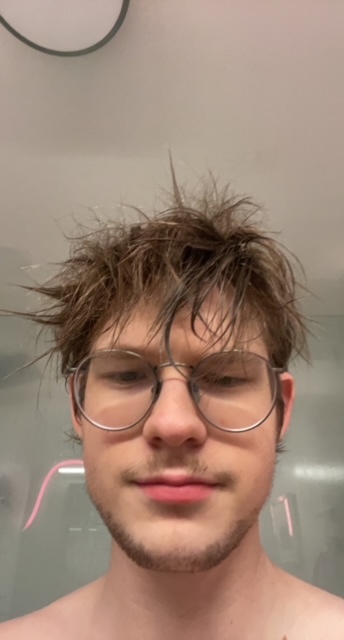 2022-06-11
2022-06-11Do we have to go out again?
I am an anxious person. Before covid it took all my energy to get up in the morning, put on decent clothes, go to school, meet with friends, go to restaurants. The lockdown was the best thing that ever happened to me. My best buddy moved in with me and my family, my classes went online, I slept more, I gamed all the time, we got takeout. Now I'm being invited places. I have to reinsert. I miss covid. -
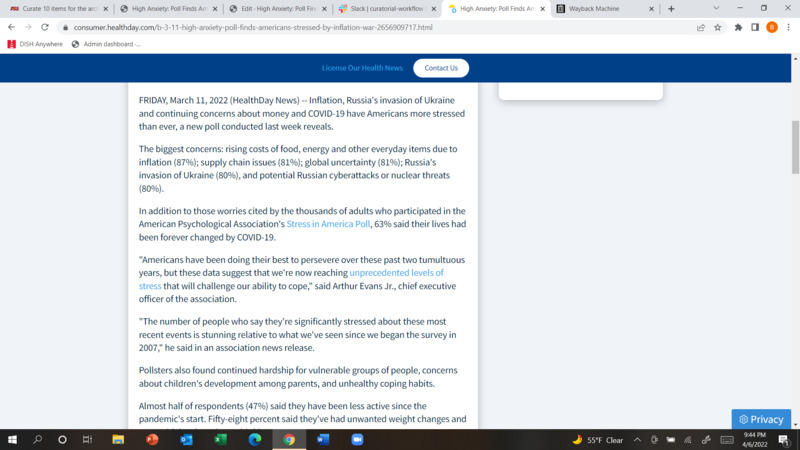 2022-03-11
2022-03-11High Anxiety: Poll Finds Americans Stressed by Inflation, War
This is a news story from Health Day by Robert Preidt. This is about a poll on what is making Americans most anxious. War, COVID-19, and inflation are at the top of what is making Americans feel anxious. Another thing the poll tells is that 63% percent said their lives changed forever due to COVID-19. 47% of people that took this poll also said that they have become less active compared to pre-pandemic. 58% said they had unwanted weight changes. Among those that gained more weight than they wanted, the average weight gain reported was 26 pounds. Others have said that the separation from others has put strain on relationships, or ended them. The APA reports that those with reduced social support are more likely to cope with stress. 56% say they could have used more emotional support during the pandemic. This poll had 3,012 respondents in February, and 2,051 from March 1-3. -
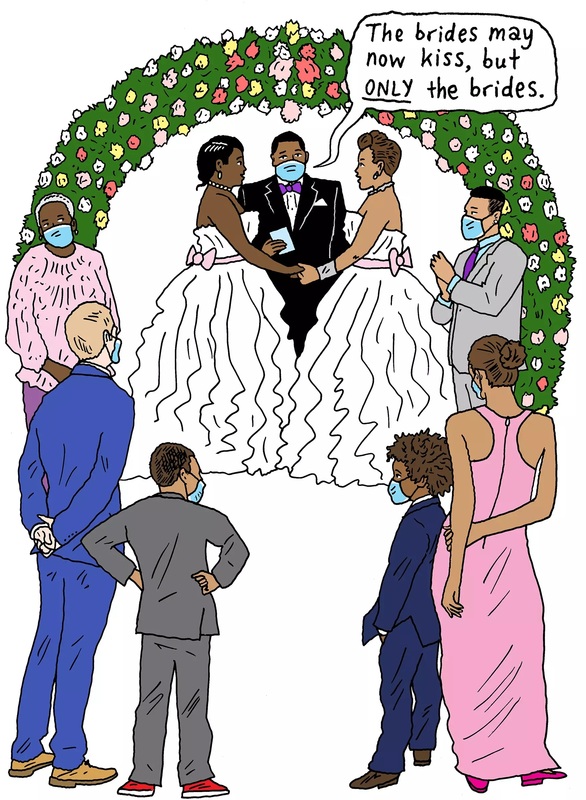 2022-03-27
2022-03-27Were masks and pandemic anxiety a useful distraction towards ideas that should not matter, but did (to many)?
Like everything having to do with public interactions during the COVID-19 pandemic, social distancing and lockdowns significantly impacted "traditional weddings." Gone were the days of large weddings, dancing around mask free and hugging the happy couple. If you search the internet, you will find a large amount of information on happy couples who had to cancel or alter their plans. Many of the #COVID BRIDES stories on this archive illustrate the extreme panic of changing plans and constant change, such as wearing masks in their pictures. The pandemic altering, delaying, or even preventing weddings has impacted society's mental health and perhaps future cultural traditions in weddings. This archive has a collection on mental health, https://covid-19archive.org/s/archive/page/mental-health, which demonstrates how hard this pandemic has been on many people. The effects on mental health shows how weddings are a popular and important tradition in American society. The ceremony is a way to share your love before others, blend families and friends, and move from a "single person" to a team. When I say wedding, I mean the customs and celebration within the ceremony, not the genders of the couple. Gay marriage has not been legal throughout America long, only since 2013. The anxiety and stress of two years of delayed/cancelled weddings during a pandemic pale in comparison to the longstanding social pressure for LGBTQ people not to marry, on top of previous legality issues. There is still a large group of Americans that have the opinion that it is "evil" or a sin. I have seen and heard in person, movies, or television disparaging remarks on the idea of two men or two women getting married and/or kissing. I wanted to highlight this picture from TIME magazine as I hope it demonstrates that masks made people freak out. The idea that the officiant and the people were so distracted and concerned about the two brides either not wearing masks or being the only two kissing while not wearing masks----rather than not being male/female made me smile. I hope some of the pain, anxiety, and discomfort of the pandemic was turned into positivity by distracting people from the meaningless idea of couple's gender and that some LGBTQ opponents realized there are bigger problems in the world. -
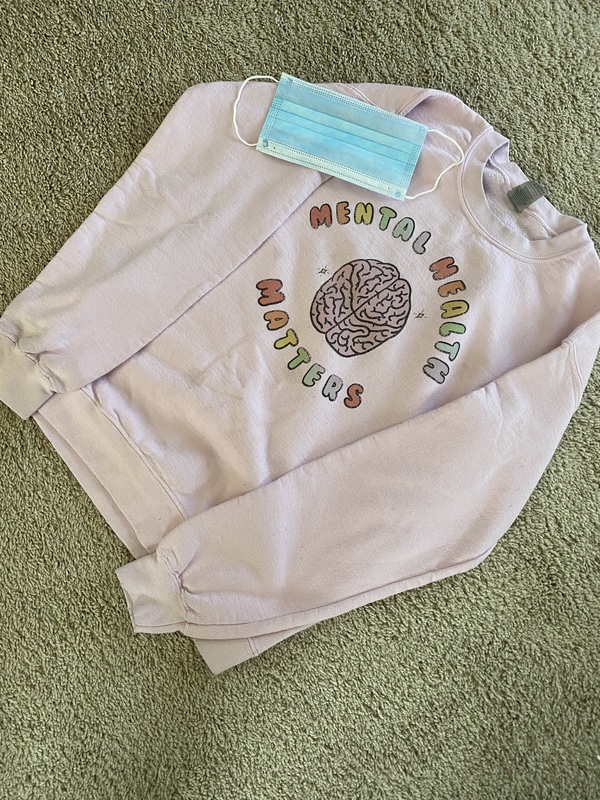 2022-03-26
2022-03-26Coping with the Pandemic--A Personal Look at Mental Health and COVID-19
According to the Center of Disease Control, in June of 2022, US adults reported considerably elevated adverse mental health conditions associated with COVID-19. Out of a survey they did on 5,412 people, 40.9 percent of respondents reported at least one adverse mental or behavioral health conditions, including symptoms of anxiety and depressive disorder which were around 31 percent. One of the causes of this is due to increase sedentary behaviors and low levels of physical activity due to quarantines and lack of business operation. Over the past two years, government mandated quarantine, work from home, and online schooling has caused me to stay at home for longer periods of time than what I use to. Because of this sedentary behavior, I had dealt with the negative effects of isolation, stress, and anxiety on both my mental and physical health. According to the World Health Organization, 150 minutes of moderate exercise or physical activity is usually recommended per week, however, with working a full-time job and being in school, the question that remains is how that is possible? I have learned to accommodate these physical needs indoors, by taking active breaks during the day and exercising at home. While this does not necessarily help with isolation and loneliness sometimes, I have learned to take these matters one day at a time and not shun myself for feelings them. CDC argues that from a recent comprehensive review that the impact of COVID-19 on mental health particularly seems to affect more young women disproportionally than any other group. Therefore, I recommend any young adult or women facing severe mental health to take advantage of online support or mental health services through telehealth such as ZocDoc. It is important to highlight COVID-19's impact on mental health in the United States and my personal life because it shows how the pandemic changed the means and the ways we received mental health services in the past. As the pandemic ventures on, people like myself will continue to have to find ways to cope and receive services for our problems. Thanks to the pandemic, much of our mental health problems have come more to the forefront due to us having ample amounts of time now to navigate and deal these issues unlike never before. -
2022-03-25
How COVID Changed my Marriage
I got married in May of 2019. When I got married, I had no idea something like COVID would happen and change the dynamics I had with my husband. COVID happened the first few months into our marriage. With it, my husband had to start working from home. I won't lie and say it wasn't an issue with my husband having to not be in the office anymore. I felt like I couldn't do as many things, as my husband had to talk to clients and go to meetings, where I couldn't be too loud. Another thing I wasn't used to at the beginning of all of this was seeing my husband far more often than just before or after work. With that, I had to learn to communicate better with any issues I had instead of bottling it up as much. As we were together more, I had to learn to accommodate for that. From reading news stories early in 2020, not everyone was able to make their marriages work, and ended up getting divorced after some spouses were made to work from home. I think that is one thing people aren't always aware of being an issue in a marriage. Sometimes too much time together can have the opposite effect, especially if communication was already shaky even before the pandemic. There were a few times I did get angry with my husband for not feeling like I was being understood. With him being at the apartment more, there were more opportunities for me to get annoyed with him. At some points though, the anger wasn't even really his fault, but my own for not dealing with the lockdowns well mentally in addition to forgetting to take medicine or do other tasks. I had to learn to speak more openly about these issues rather than letting them linger. Funnily enough, it wasn't until February of this year that we both really learned to talk to each other more productively. The big fight we had was partly from me feeling jealous of how my husband would talk to his friends more often than he would me, as for a while by that point, we had gotten into a routine during COVID of both of us being on our phones way more than we should be. We later had to come to the agreement to set aside specific time for each other without using our phones. It has already been over a month since that change, and the relationship has improved drastically. Some of my habits that I made to help cope with COVID and general anxiety issues kept me from having as solid a relationship with my husband. Intimacy was another issue that came up due to my husband working from home. Even though we physically saw each other more often, we didn't kiss nearly as much as we used to. I think that sometimes kissing goes to the wayside if people become too busy. This was something we ended up having multiple discussions on, as we wanted to show more affection with each other, but did not think to do it. Overall, the biggest changes that happened in my relationship with my husband because of COVID was the way we communicated. Being together in person more often meant we had to work through multiple issues we had prior to COVID or because of COVID. Being alone together more often may seem like an ideal situation to some people looking from the outside, but with it can bring a host of new issues. Some people during the pandemic learned this the hard way and ended up getting divorced. The problems me and my husband have had were not unsolvable, but they take some maturity to work through without it causing resentment. I think sometimes of what it would have been like if COVID never happened early on into our marriage, and now I am glad some of it did, because I have become a better wife and am able to meet my husband's needs better than before. Life really did hand me one very tart lemon by having to deal with a pandemic the first few years in marriage, which many say are some of the most vulnerable years for a couple. That tart lemon has since been made sweet, but only because both of us were able to recognize problems and figure out ways to help each other. -
2022-03-24
High Functioning Autism during a Pandemic
For those that are somewhat familiar with autism, one might believe the pandemic was perfect for someone like me. People were encouraged not to speak to each other in person, everyone had to keep a distance, and masks were everywhere to conceal the face. These things, for me, were what I dreaded. I had a pretty good routine going before the pandemic. I had just graduated college with my bachelor degree and was getting used to being married. I was also caring for my grandma as one of my first jobs. I got to get up every morning, earn money, and make sure my husband was well cared for. My husband and I would go places for date nights and we would sometimes do spontaneous things like midnight grocery shopping for ice cream. Things were just carefree. Then a few months into our marriage, things changed a lot (more for me than for my husband). I enjoyed going to church in person for both my spiritual needs and for the social aspects it gave me. Once March 2020 happened, I couldn't go to church in person. Church was online and it became harder for me to get into it and actually concentrate. I then just stopped going altogether for a while because I wanted to have that human connection I was missing. Eventually, I was able to go to church again, but I had to wear a mask. I dealt with it even though I didn't like it. It was sad to see so many people's faces covered by cloth. It made it feel like I couldn't connect to people as well. My social skills aren't terrible if everyone wears a mask, but I'm more likely to miss certain cues or tell when someone is joking. I focus on the mouth a lot when people talk, so not getting to see mouths was bothersome. Other elements of my life changed, and autism made it worse for me in some ways. Due to my older habits of wanting to go places more often, the stay-at-home orders that occurred at the very beginning made me feel like a prisoner and that I couldn't choose things for myself as often. This increased my anxiety a lot, to a point of a mental breakdown. My husband was luckily very understanding of my issues, so I was eventually able to recover once I gave myself more work to occupy my time with. Of all the COVID rules I had to follow, social distancing was one of the easiest things for me, but only in a few ways. I was fine with talking in person from a distance, as I already do that naturally, but I was not okay with having to talk to people more often through online video like Zoom. Zoom feels so unnatural because seeing people through video is not the same as seeing them in person. I didn't have to do it very often, but I was greatly unhappy at the annual family Christmas celebration in 2020 was all on Zoom. It didn't feel as festive as I would have wished. Autism in general has made COVID much harder to deal with, and sometimes I think that if I didn't have it that I could have adjusted better to the abrupt changes COVID brought into my life. I did learn some things though. I learned that I need a set routine to get things done, and that if I have a problem, I shouldn't feel afraid to be more honest about it. With my husband having had to work from home due to COVID, both of us have had to work on better communication skills. I don't think everything I've learned from this experience has been bad, but it's also not something I want to go through again. -
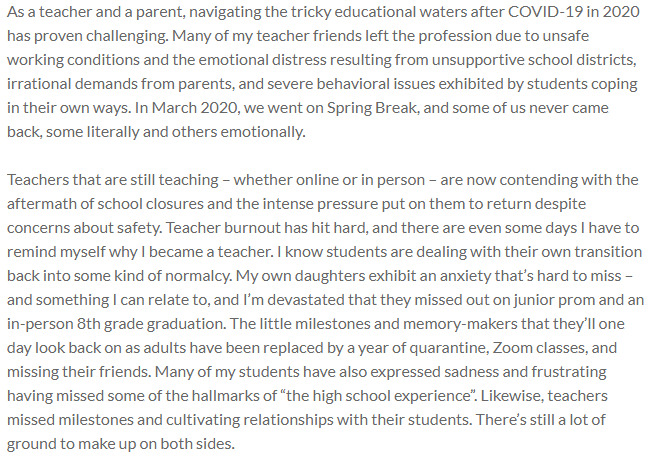 2022-01-16
2022-01-16Still On Spring Break?
As a teacher and a parent, navigating the tricky educational waters after COVID-19 in 2020 has proven challenging. Many of my teacher friends left the profession due to unsafe working conditions and the emotional distress resulting from unsupportive school districts, irrational demands from parents, and severe behavioral issues exhibited by students coping in their own ways. In March 2020, we went on Spring Break, and some of us never came back, some literally and others emotionally. Teachers that are still teaching – whether online or in person – are now contending with the aftermath of school closures and the intense pressure put on them to return despite concerns about safety. Teacher burnout has hit hard, and there are even some days I have to remind myself why I became a teacher. I know students are dealing with their own transition back into some kind of normalcy. My own daughters exhibit an anxiety that’s hard to miss – and something I can relate to, and I’m devastated that they missed out on junior prom and an in-person 8th grade graduation. The little milestones and memory-makers that they’ll one day look back on as adults have been replaced by a year of quarantine, Zoom classes, and missing their friends. Many of my students have also expressed sadness and frustrating having missed some of the hallmarks of “the high school experience”. Likewise, teachers missed milestones and cultivating relationships with their students. There’s still a lot of ground to make up on both sides. -
2020-09-09
The Four Walls of Insanity
The day my life completely changed, QUARATINE had been announced in my district. What had begun as a light conversation with no expected impact on us later came to crumble our walls of reality and how vulnerable we really are. We live in a time of the future a virus wasn't expected to take so many of us out the thought that we've evolved beyond this point was false. We were unprepared for anything that was to come. I never got to enjoy my senior year complete my senior year, a year I'll never get back. I had begun with so much excitement it was my senior year in cross country I gratefully got to finish my season with all my teammates and some of my best friends from high school. However that would later come crashing down as I was getting excited for prom season shopping for a new dress and planning the night out with friends we were sent on a "2 week spring break" I never got back. Classes continued online, I no longer was able to do my daily routine of going to school then practice with friends. From now on any interaction was via Zoom or FaceTime we longed for reconnection. I'm someone who thrives off interacting with my friends especially pre quarantine the lack of interactions was draining me. I had to find a new way to cope which as you can see led to many hair color changes within a couple months. The four walls I would be so excited to come to after a long practice now became a prison cell. I would't change the way I chose to quarantine because I saw the negative affects of socializing with sadly one of my neighbors passing during that height of pandemic. However we are all only human and selfishness is part of who we are and I think it's fair to say my mental health took a large toll during the couple months that felt like years. Once my family as well as others became more lenient I was a able to hangout in small groups of people but never large and still fear it a little over 2 years later. I don't believe I have fully recovered from the situation this time period put us through. The isolation did allow me to discover new interests and how to spend time with myself which can be difficult, as well as an appreciation for long walks on your own. However it was a confusing time and one that only brought about more anxiety and fear with someone who deals with this struggles on the daily. -
 2020-03
2020-03Dealing with my anxiety
As most young adults my age, I suffer from severe anxiety. Dealing with anxiety daily, can be very challenging at times, especially during a pandemic. I have been fighting a battle with anxiety most of my life. At this point, I am really used to the extra thoughts in my head. I have learned to help manage it, but not completely get rid of it. I believe that anxiety has made me who I am, in a way, because I do not remember a time where I was not struggling. In 2020, a pandemic instantly flooded the world. This completely impacted my entire life. I was not able to experience my last year in high school, I was not able to be around the one person that helped me with my anxiety, etc. I was forced to wear a mask that I could barely breathe in. I lost touch with most of my friends that I developed over my lifetime. This instant wave of depression suddenly hit me. I was so nervous on what would happen next, and how long will this last. People were dying from this pandemic. I constantly worried about if the sickness would hurt one of my family members or someone important to me. Over the time of being in quarantine, I thought to myself ways on how I could relax and not worry so much about the pandemic. I told myself every day, “Everything happens for a reason”. This is what I truly believe and for some reason it really does calm me down. I am Catholic. I am a very deep believer in God. To me, trusting in the Lord is the best anxiety reliever around. Covid-19 is still around today. Without Covid-19, I would not be where I am today. Although this pandemic has an abundance of negative impacts on my life, it also had some positive ones, too. I would not have attended Duquesne University, met so many amazing people, and made a plethora of memories that I would not trade in for. I believe talking about my anxiety, especially during the pandemic, is very critical because I am not the only one who is suffering, too. Everyone is nervous about what is going to happen next. To me, this is HUGE on helping me with my anxiety. I can finally think to myself that I am not alone. I believe that people who suffer from anxiety, especially from the pandemic started in 2020, can have a place to go if they are nervous. When I was struggling, I felt alone, and I was the only person who felt this way. My story will allow people to realize that they are not alone. Everyone is dealing with this stress and anxiety that I suffered from. My story tells people that I have worries and doubts, too. The pandemic not only had negative impacts, but they also had positive impacts. Focusing on the positives, will distract you from the anxiety and worrying. My story should help prove that. My story should allow people to see and find new ways to cope with the stress. I hope my story leaves a positive impact on people who did or are struggling. Everyone is in this together, and nobody will be alone in this major impact on the world. -
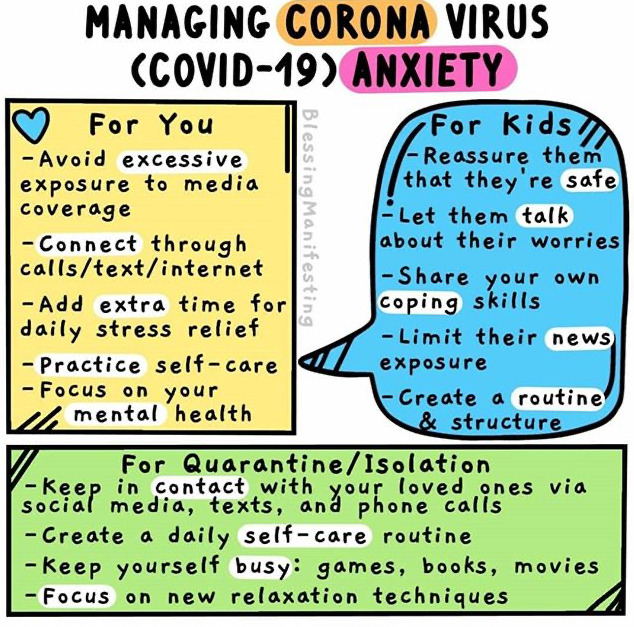 2020-03
2020-03Suffering from Anxiety
As most young adults my age, I suffer from severe anxiety. Dealing with anxiety daily, can be very challenging at times, especially during a pandemic. I have been fighting a battle with anxiety most of my life. At this point, I am really used to the extra thoughts in my head. I have learned to help manage it, but not completely get rid of it. I believe that anxiety has made me who I am, in a way, because I do not remember a time where I was not struggling. In 2020, a pandemic instantly flooded the world. This completely impacted my entire life. I was not able to experience my last year in high school, I was not able to be around the one person that helped me with my anxiety, etc. I was forced to wear a mask that I could barely breathe in. I lost touch with most of my friends that I developed over my lifetime. This instant wave of depression suddenly hit me. I was so nervous on what would happen next, and how long will this last. People were dying from this pandemic. I constantly worried about if the sickness would hurt one of my family members or someone important to me. Over the time of being in quarantine, I thought to myself ways on how I could relax and not worry so much about the pandemic. I told myself every day, “Everything happens for a reason”. This is what I truly believe and for some reason it really does calm me down. I am Catholic. I am a very deep believer in God. To me, trusting in the Lord is the best anxiety reliever around. Covid-19 is still around today. Without Covid-19, I would not be where I am today. Although this pandemic has an abundance of negative impacts on my life, it also had some positive ones, too. I would not have attended Duquesne University, met so many amazing people, and made a plethora of memories that I would not trade in for. I believe talking about my anxiety, especially during the pandemic, is very critical because I am not the only one who is suffering, too. Everyone is nervous about what is going to happen next. To me, this is HUGE on helping me with my anxiety. I can finally think to myself that I am not alone. I believe that people who suffer from anxiety, especially from the pandemic started in 2020, can have a place to go if they are nervous. When I was struggling, I felt alone, and I was the only person who felt this way. My story will allow people to realize that they are not alone. Everyone is dealing with this stress and anxiety that I suffered from. My story tells people that I have worries and doubts, too. The pandemic not only had negative impacts, but they also had positive impacts. Focusing on the positives, will distract you from the anxiety and worrying. My story should help prove that. My story should allow people to see and find new ways to cope with the stress. I hope my story leaves a positive impact on people who did or are struggling. Everyone is in this together, and nobody will be alone in this major impact on the world. -
 2021-10-09
2021-10-09The Challenges of Performing Arts During the Pandemic
This is a short audio file that talks about what challenges I faced during the pandemic, including a performing arts that was shut down the day before opening night and then a successful fundraiser that raised $25,000. -
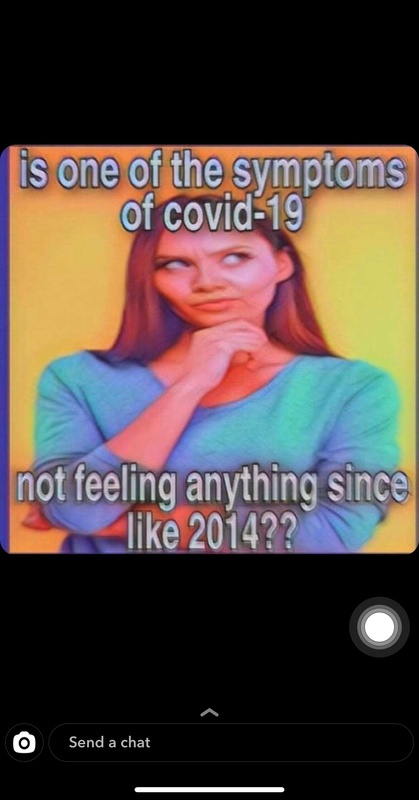 2020-03-24
2020-03-24Symptoms on the Youth
When the pandemic first broke out out, many people didn't know what to think. In millennial and gen z fashion, many young adults turned to the internet to crack jokes and voice their opinion about the upcoming crisis. This meme pokes fun at the uncertainty of the viruses' signs and symptoms many medical and governmental officials had at the beginning of the pandemic. The mem also pokes fun at the idea of teenage angst and anxiety a rapid number of young adults are starting experience more and more during this recent decade. The pandemic may cause your nose and mouth to not feel anything but the real question is if young adults are really "feeling" the impact of what is going on? A Forbes report in April of this year has indicated that young people between the ages of 18-24 are starting suffer from more mental health problems than any age group since the pandemic started. Think what you will but this study definitely proves that more young adults will suffer long lasting effects of pandemic during and after the global crisis comes to a end. I liked this meme because it a representations of some of my numbs feelings I have had during this pandemic. -
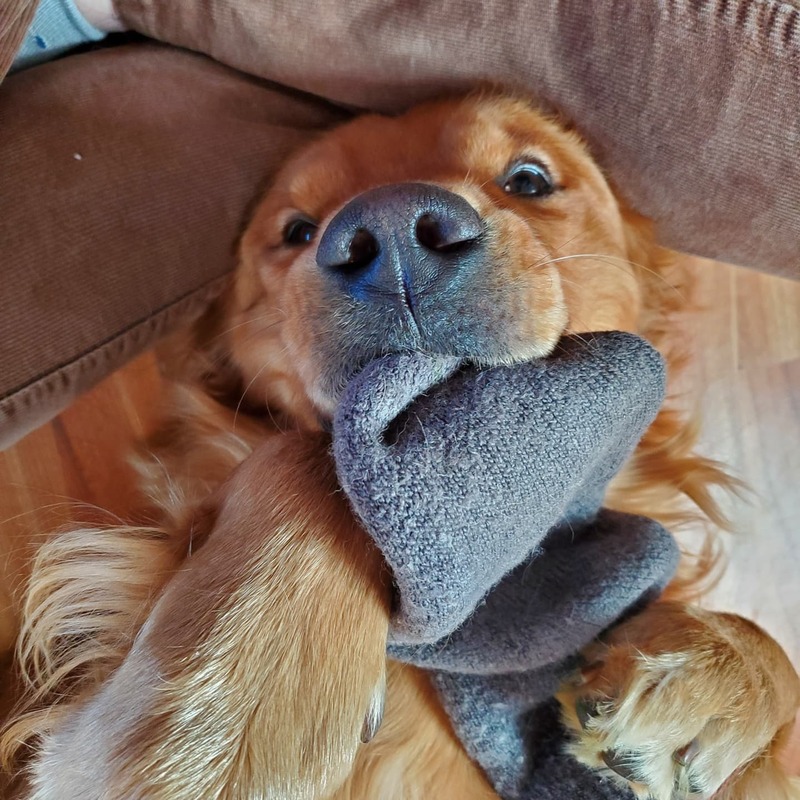 2021-10-03
2021-10-03Homage to My Best Friend
This is an image of my dog, Dobs – I’ve shared him before on this archive, but I just needed to share this image and justify as to why this dog is so important to me. When the pandemic began, I found myself more isolated than normal, as many people had; I barely spoke to my friends online, and began withdrawing into myself more and more with each day. I would have been completely alone. I don’t have much to say, but this is my best friend; he’s been here with me through some of the worst experiences I have faced during the pandemic, I won’t go into them too deeply, but I am just happy to have this dog in my life, his friendly nature and his funny faces really have had an impact on how I’ve been able to cope with so much. -
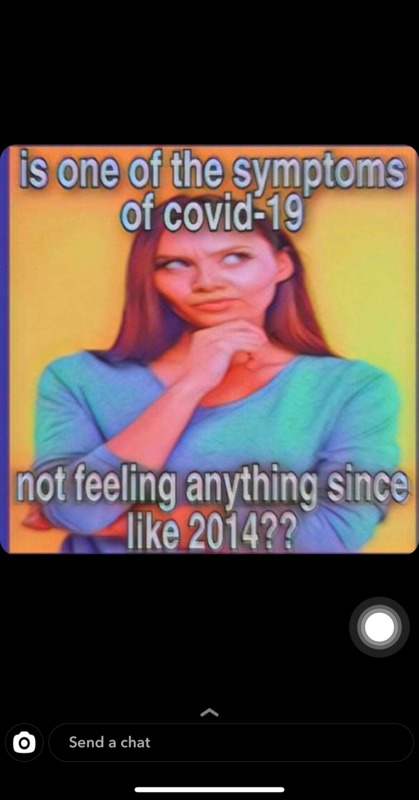 2020-03-24
2020-03-24Feeling Again
When the pandemic first broke out out, many people didn't know what to think. In millennial and gen z fashion, many young adults turned to the internet to crack jokes and voice their opinion about the upcoming crisis. This meme pokes fun at the uncertainty of the viruses' signs and symptoms many medical and governmental officials had at the beginning of the pandemic. The mem also pokes fun at the idea of teenage angst and anxiety a rapid number of young adults are starting experience more and more during this recent decade. The pandemic may cause your nose and mouth to not feel anything but the real question is if young adults are really "feeling" the impact of what is going on? A Forbes report in April of this year has indicated that young people between the ages of 18-24 are starting suffer from more mental health problems than any age group since the pandemic started. Think what you will but this study definitely proves that more young adults will suffer long lasting effects of pandemic during and after the global crisis comes to a end. -
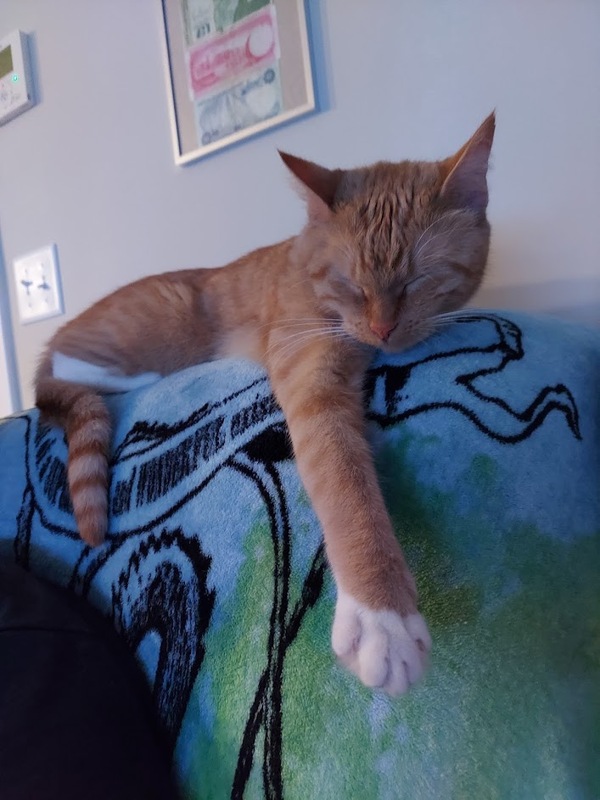 2020
2020Nervous Cats: Pandemic Pet
I first adopted my cat, Beans, in 2018, so she wasn't technically a "pandemic pet." However, she ended up becoming very anxious during the pandemic, especially with the first lockdown of March 2020, since I was home all the time! She has since developed mild "separation anxiety," and has to travel with me wherever I go. She is super adorable though :) -
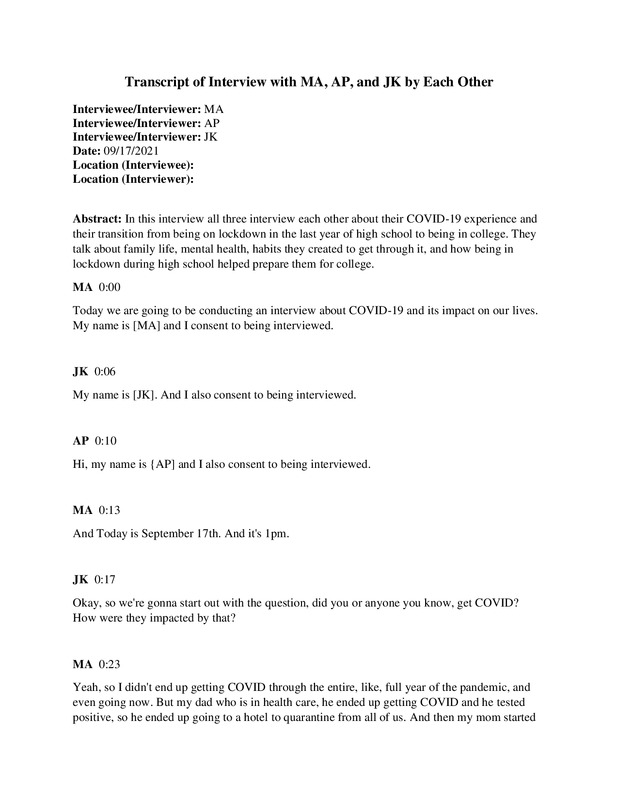 2021-09-17
2021-09-17MA, AP and JK Oral History, 2021/09/17
This is a casual interview about the effects of COVID on mental health, academics, family life, etc. We discuss the biggest impact COVID had on us, our experience with the pandemic, what we did over quarantine, and much more, from the perspective of college freshmen. -
2020-03
Recollections from an Oncology Nurse
My mom is an oncology nurse and has worked in the field of nursing for the past 30 years. I recently asked her to talk to me about her experience this past year as a healthcare worker. She recalled the first week in March when things were becoming intense. People were asked to wear face shields and gowns as they were working in an immune-compromised area where the patients had cancer. At the time there was no vaccine. “It was incredibly intense and scary” my mother said. “People were worried about getting Covid from other staff at the hospital and also worried about contracting Covid from the patients.” “I walked into the hospital and there was an incredible underlying anxiety, the feeling of unease was palpable. People did not talk to each other like they normally did - everyone was consumed with the thought of not using each other’s pens, putting gloves on when receiving things from the pharmacy. Things we would never have even thought of before.” She continued, “It was a feeling of both being unsettled and a blind trust you put in your coworkers to be as clean, as responsible and in isolation outside of work as you. The intensity of that feeling was there the moment you walked in. The environment had changed. People were not as happy, communicative, relaxed.” She explained how working in Covid - there was an incredible newness to it - a fear and apprehension. -
 2020-04-20
2020-04-20Nature can boost your mental health during COVID-19 pandemic
The pandemic has negatively affected many individuals' mental health. This article describes the benefits nature can provide in improving one's mental health during this time. -
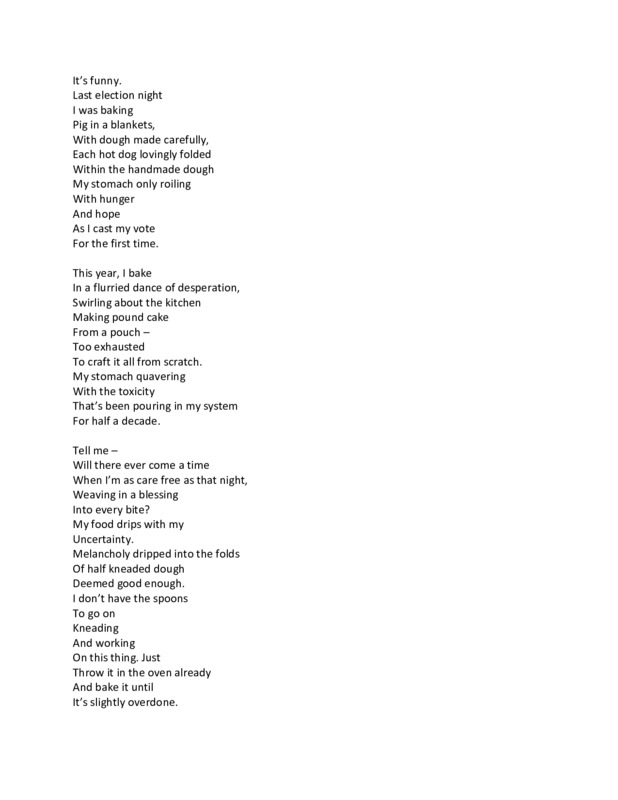 2020-11-03
2020-11-03Election Night 2020
This poem sits at the nexus of pandemic life and political desperation. My wife lost multiple elderly family members to COVID because her parents believed the rhetoric spread by Donald Trump and those like him. Five years of dealing with racist, sexist, homophobic and transphobic bigotry being the political norm, and eight months of a pandemic in the heart of one of the largest science denying states in the country led to this moment of desperation, where all I could do was blindly bake and write to get the nervous energy out. -
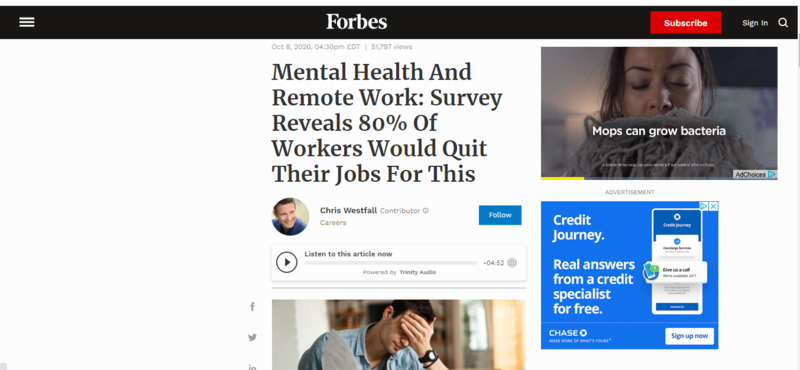 2021-07-23
2021-07-23Mental Health And Remote Work: Survey Reveals 80% Of Workers Would Quit Their Jobs For This
Teleworkers during the pandemic have experienced mental health challenges. For some individuals, working from home during the pandemic has increased their anxiety and stress levels. They have found it difficult to unplug from work, work longer hours at home than they did in the office, and struggle with the lack of social interaction. This article discusses ways that employers can support their employees and address their mental health struggles. -
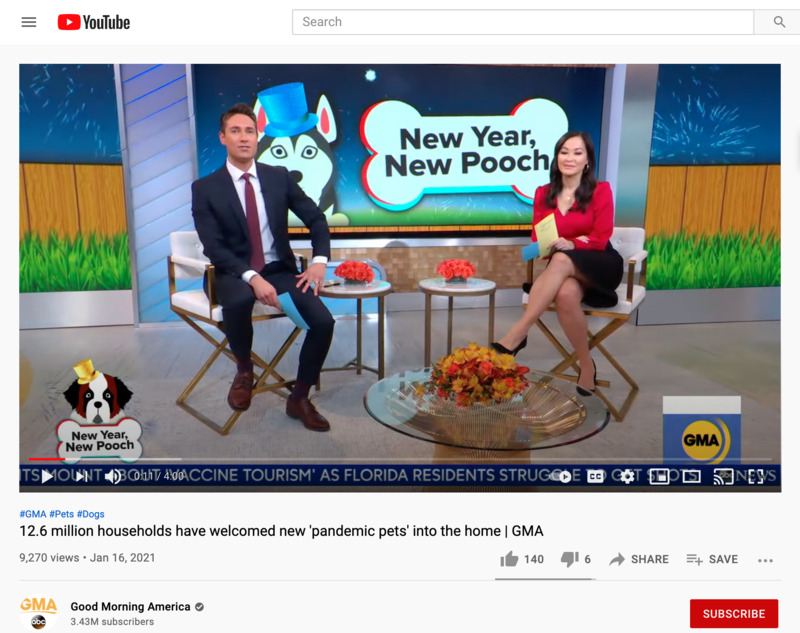 2021-01-16
2021-01-1612.6 million households have welcomed new 'pandemic pets' into the home
This story from Good Morning America talks about how 12.6 million households got new pets during the pandemic. Now some of those pets are not used to being alone. An expert trainer, Eric Ita, gives tips for pups with separation anxiety and other advice for dog owners. -
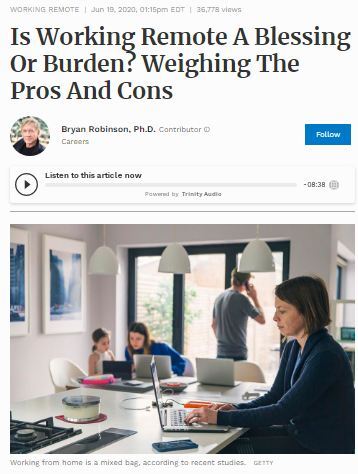 2020-06-19
2020-06-19Is Working Remote A Blessing Or Burden? Weighing The Pros And Cons
This article discusses the pros and cons of changes to productivity caused by the shift to teleworking during the pandemic in countries around the globe. Major themes are mental health and work-life balance. -
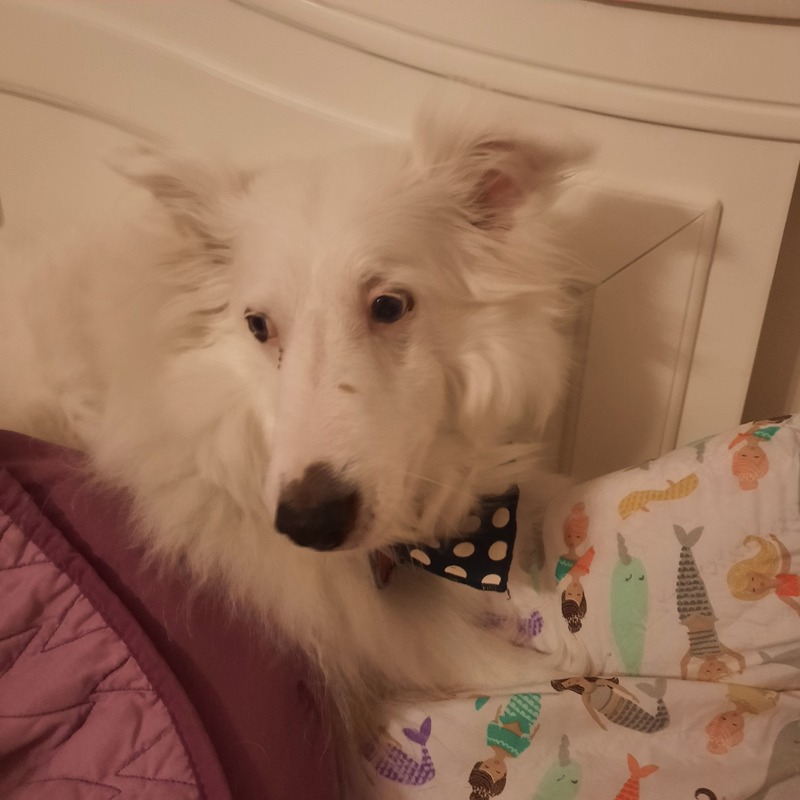 2021-07-03
2021-07-03A Dog's Tale
This is Hannah aka Hannah Banana. My husband and I adopted her May 4, 2013 from a rescue in St. Catherine's, ON. We live just over the border in Buffalo, NY. Hannah is a purebred Sheltie (Shetland Sheepdog), but purebred gone wrong. She is what is called a double merle. That means an irresponsible breeder bred two merle coated dogs together, which results in 25% of the litter being born deaf, primarily white in color, and with eye problems or missing eyes altogether. Hannah was approximately 4 years old at the time. The previous owners who surrendered her had had her for 2 years. They had adopted her from a shelter that had picked her up as a stray. Hannah was our 2nd double merle (we also have an Aussie with the same problem), so we were used to the unique problems associated with deaf and vision impaired dogs, but Hannah came with many more from a history of abuse and neglect. One of her biggest issues was that she was absolutely terrified of people, particularly men, and she hated small children. We worked with a trainer, we did agility twice a week, and did barn hunt once a week. She broke out of her shell a lot, but did not lose her fear of people. In 2016 my husband and I had our first and only child, Charlotte. Hannah was very aggressive towards her. She would bark and snap at her. We had to keep her separated a lot, and we worried about what the future would bring. She got a bit better when Charlotte could walk, but not to a comfort level. Once Charlotte was about 3, Hannah accepted that she was a human in the house but wanted nothing to do with her. She didn't really want to have much to do with any of us or our other dog except for at agility class. She wouldn't play with us and only tolerated petting for a short while. Fast forward to 2020. While COVID-19 was cause fear, anxiety, and depression in people, for Hannah it was just what she needed. After a few months, she became a whole new dog. Having all three of her humans home 24/7 seemed to alleviate a lot of her fears and anxieties. She completely bonded with Charlotte. She actually plays with her and snuggles with her and sleeps in her bed. Who knew this 12-year-old dog just needed constant companionship to heal her old wounds. Luckily, my career path changed during the pandemic (I am going back to school to pursue a PhD) and so I will continue to be home a lot of the time. While COVID did bring devastation to people across the world, for one little dog it was just the medicine she needed. -
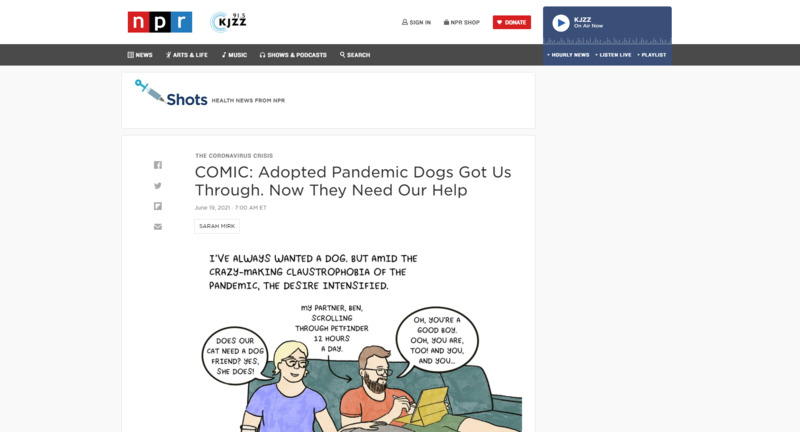 2021-06-19
2021-06-19Pet Adoption Comic NPR
This comic is fun, engaging, and informative. It talks about the increase in pet adoption during the pandemic and how pets helped a lot of people deal with emotional trauma. It cautions would-be pet owners not to jump blindly into adopting and to think about what will happen when life returns to normal. Separation anxiety can be difficult for pets to deal with, and owners need to have a plan for that. -
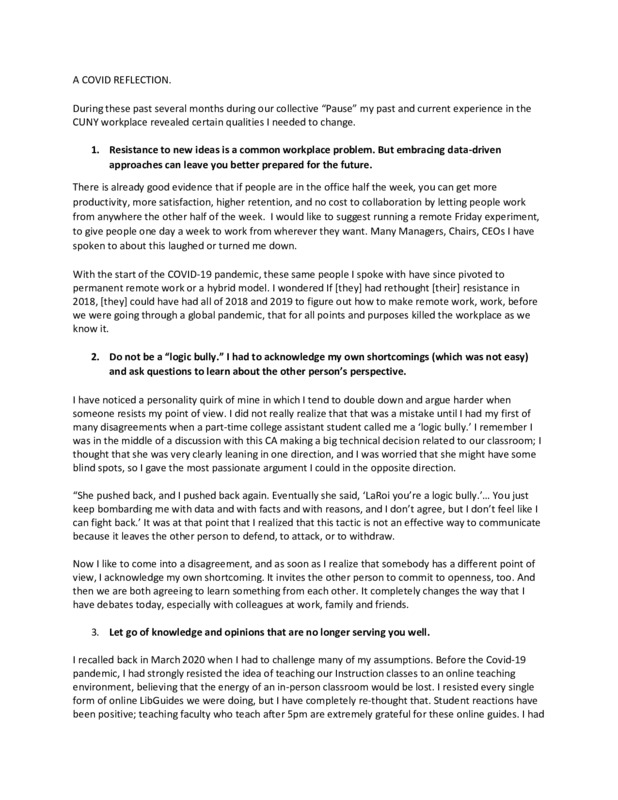 2021-05-18
2021-05-18A COVID 19 Reflection
Observations and lessons learned and learning during this Pandemic. -
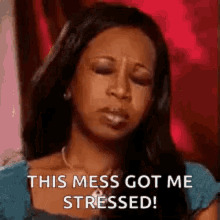 2020-05-07
2020-05-07A College Student During The Pandemic
For my primary source, I selected an essay that was written by me my first semester in my Psychology class. I don’t exactly know the date it was made or submitted, there were question we were supposed to respond in our own way but it’s not able to be provided anymore. But we wrote it as a final in order to express the way we felt during the pandemic, also to see how our mental and our physical changes during this rough time. My professor which was called Dr. Marjorie wanted to know everyone’s story in our own words and the different perspectives that came from the students, which she enjoyed doing. I lived in New York the area of the country hardest hit by the first wave of the pandemic. I was afraid when the outbreak got worse day by day, watching how this changed every human being because no one was prepared for all this chaos that was happening. I didn’t know on March 10 that this outbreak was on campus which is why we couldn’t come back until further notice to protect us from contracting COVID. Seeing the news and watching the death tolls go up by the hour of the amount of people dying in the hospitals and others contracting the virus was horrifying and sad to watch. That’s all they gave on the news which made me paranoid and decided to stop watching it during the entire quarantine. The way I saw how the streets were empty, New York wasn’t the same anymore it looked very dull and sad as if it was the end of the world not seeing anyone outside walking or any cars either. Everything was limited especially in the supermarkets having a limit capacity of people in it, the long lines were unbearable. Not being able to go out being of how paranoid I was being around people, I lasted about 1 month and 3 days home without going out only when it was necessary to go out. I selected this important source because I want historians of the future to understand my situation as a college student living through this pandemic. Having to go from classes in person to virtual classes in a snap of a finger that’s when my frustration started, not being able to understand anything without seeing the professor to explain it to me. I had to do everything on my own without anyone’s help. Stressing me out completely, which caused drastic changes to me during quarantine. My appetite wasn’t at its best having to do so much work at a time with all my classes especially being a full time student wasn’t easy for me because I never took breaks only when I was called to eat. My body started to fail on me feeling weak, tired, and constant headaches. That’s when it all went downhill my anxiety started to crawl up on me, I didn’t know how to control it anymore because coping with it was difficult having all of these constant breakdowns, feeling tight to the chest and shaking as if I was nervous. I’ll have all that through the stress and overthinking it caused because I didn’t want to feel like a failure. Putting pressure on myself caused lots of harm which had consequences to it later on. Then I started to lose weight, not being able to wake up the same anymore as if I had no energy to do anything throughout the day. I was afraid of having a panic/anxiety attack which were the worse. I endured depression along the way as well, I started to get sick out of nowhere without having anything. The pandemic really messed me up mentally. -
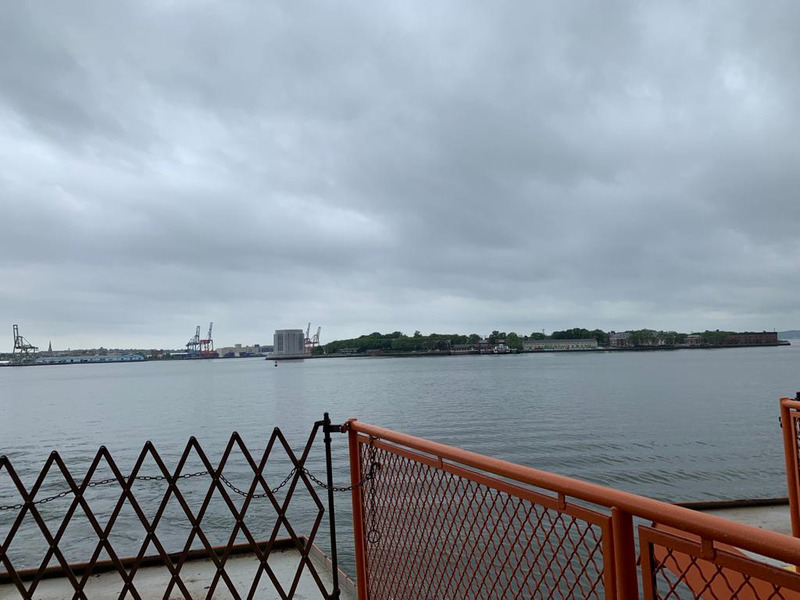 2021-05-29
2021-05-29COVID-19 and Mental Health
I took this picture on May 29, 2020, at 10:35 am. Why I choose this picture? This picture reflected my feeling in 2020. After months without going outside, I was heading to Staten Island to visit my aunt. I remember that I had anxiety even to open the door of my apartment. Whenever I went outside, it was close to my apartment, and my skin started to itch for no reason. My family used to watch the news the whole day. I was tired of listening to the report. Besides, during COVID-19, I was having an awful time. A few months ago, one of my friends died, and It was depressing for me. Before she died, I let my ego break the relationship between us. I refused to call her or text her because I was tired of looking after her. I remember my father told me to call her because I did not know what was happening with her. I ignored him. Riding to Staten Island that morning made me remember the hard time that I was going through. The day that I went to Staten Island, it was cloudy and dark. I thought that the ferry would sink into the water. When I got to Staten Island, it started to rain, and I did not bring an umbrella. I was mad, but it was my fault for not checking the weather. I compare that dark and desperate day with the mourning of my friend and the pandemic. For months, I felt guilty and thought that I did not deserve anything good in my life. The worst of all of this is that I did not have anybody to talk to. I was in quarantine for months, and it affected my mental health. I had no desire to continue college and my business. I used to cry a lot, and all I wanted was to talk to someone about how the pandemic and the death of my friend affected me. I had desired to go to the Dominican Republic, but I could not go. I think that this source can help historians because they can get to know about different perspectives of people during the COVID-19 pandemic. They would notice the anxiety that not only I went through, but everybody around the world had been through. My neighborhood was affected significantly. Some of my neighbors got COVID and died from it. I know that many people saw themselves as the picture. They thought that everything around them was going to end. They thought that they would be stuck in the pandemic forever. -
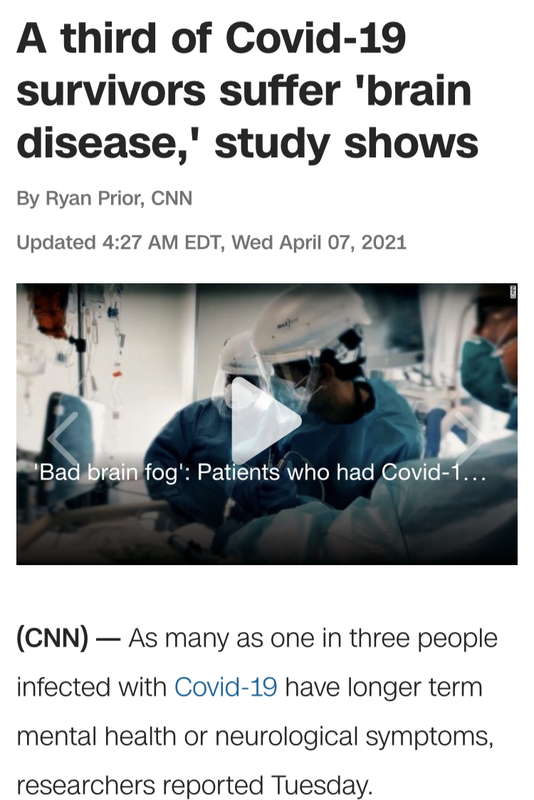 2021-04-07
2021-04-07COVID-19 and the Brain
COVID-19 has gone through a number of classifications. First as a “flu,” then as a “respiratory disease,” then as a “vascular disease,” and is in more recent studies, as a “brain disease.” Some reports are finding that one out of three COVID-19 survivors have mental health and/or neurological issues. This not only informs us of the complexity of COVID-19, but also brings light to the need to continue medical and psychological support of COVID survivors. Some survivors are described as having PTSD, and anxiety disorders are being diagnosed in a number of survivors. Neurologically, many survivors report “brain fog” and other issues. Another unexpected toll the virus takes on those infected. -
 2021-03-28
2021-03-28Vaccinated
I know the LGBTQ+ Community has a higher chance to have depression, anxiety, and other health ailments like many other minority communities. This Friday I got my second dose of the vaccine. I have been encouraging others in my LGBTQ+ Community to get the vaccine so this is one less health ailment they have to worry about. -
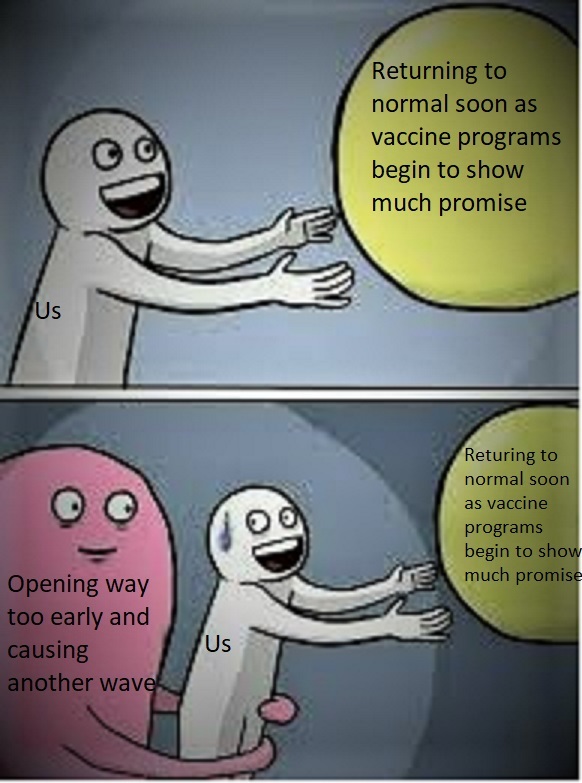 2021-03-17
2021-03-17Opening Early Meme
As more and more vaccines are being given, it seems that soon we may be able to slowly begin returning back to normal. However, with mask mandates and restrictions falling off early across the United States, I remain fearful that we may experience another wave/peak. This meme demonstrates that anxiety. -
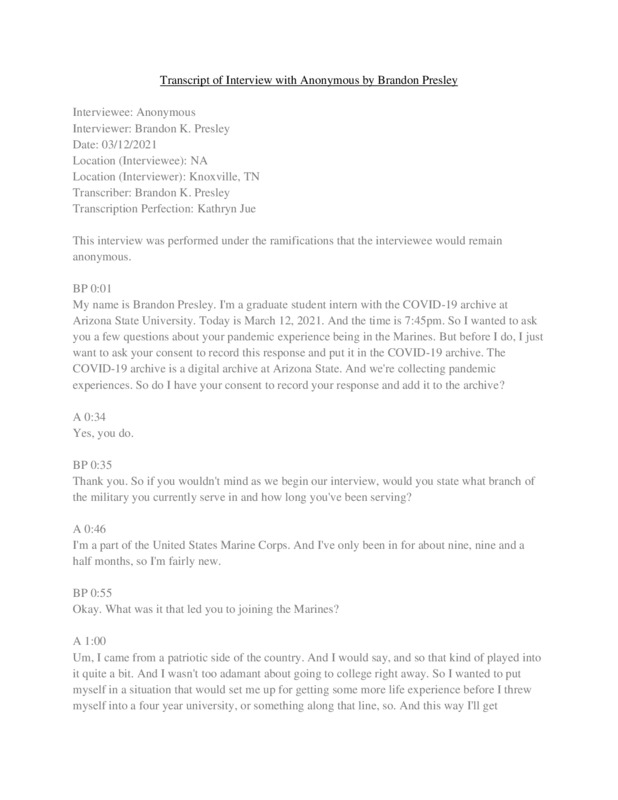 03/12/2021
03/12/2021Anonymous Marine Oral History, 2021/03/12
Interview with a Marine that details going through Basic Training during COVID-19. -
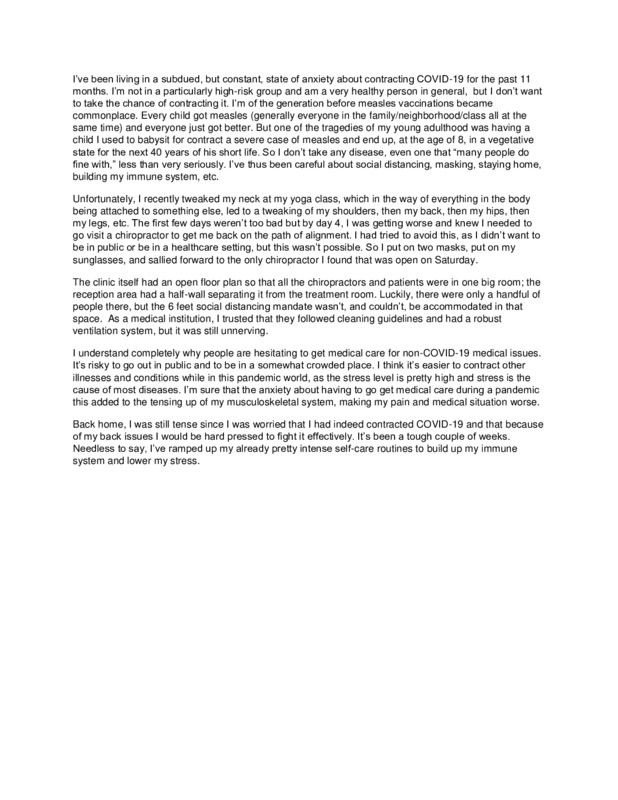 2021-02-05
2021-02-05Getting Sick during a Pandemic
I recently have struggled with a medical issue related to my back, quite possibly brought about by the stress of the pandemic. Getting sick during a pandemic is not only more common, due to stress, but also unnerving as you must go out to medical appointments, be around sick people, and worry about your sickness interfering with your body's work in fighting off the COVID-19 virus. -
2021-01-31
Volunteering Breaks Hearts
I volunteered at one of the County’s vaccination clinics last week. The health department ramped up their vaccination schedule, and we saw nearly 50% more traffic than the week prior, which was already 30% above its projections. Many of the folks over 65 (group 1C) here in Tucson are going up to Phoenix to be vaccinated as local health officials are still working their way through the 75+ crowd (Group 1B1). It has been both heartbreaking and frustrating that about a third of the vehicle occupants beg and plead for some special exemption for a family member who’s with them. Despite not yet being entitled to be vaccinated themselves, they hope someone lets them cut in line. Everyone has a special need and a special, unique circumstance that should enable them to jump ahead of their neighbors, and the selfishness of it agitates one of my few prejudices, especially when they don't take the initial 'no' for an answer. The public is so terrified, and many seem to fear they won’t manage to avoid illness in the coming weeks despite having done so for ten months now. It hurts my heart to see their suffering, to hear their fear and anxiety, to have to turn them away, and to know they’re asking for special treatment that might deny the delivery of vaccines to the most vulnerable populations. The hardest part has been, though, the number of elderly folks entitled to be vaccinated who can't navigate the online portal to get an appointment. The current vaccines are stored so cold that we can't deviate from the allotted appointments, but every day brings in elderly people who can't function in a digital world. The county can't spare personnel to offer immediate and realistic registration help to them, and many have complained of waiting on the phone for hours, only to have the county phone line hang up on them. The situation makes me want to find their grandchildren and ask why they don't give a damn about helping their grandparents. I also found out last night our organization's portion of the operation is winding down, and I do not expect to again be able to help facilitate vaccinations in my community. With time and eventual immunization, I hope to find other ways to serve my neighbors. -
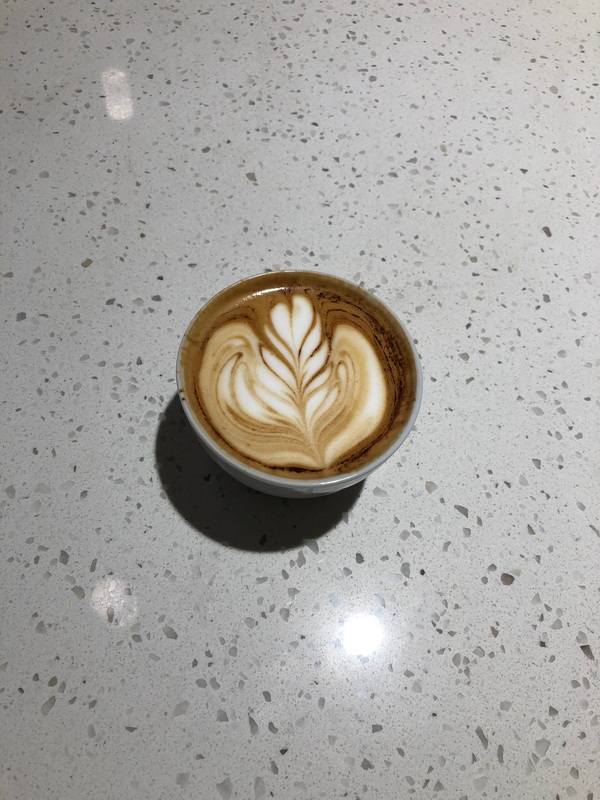 2021-01-31
2021-01-31Distracting Myself with Latte Art
At the moment, the only reasons I leave the house is to shop for essentials and for work. As a barista, my job can get fairly uncomfortable, as there is often a struggle between me and the customer, as they immediately want to remove their mask and take a sip of their drink instead of waiting until they are at a table or outside, or they don't want to wear one at all and refuse to comply when we ask. We also have pushback against limiting indoor seating and maximum capacity of the store, as we do have a small shop that makes it difficult to distance. It has led to tense interactions and anxiety leading up to shifts, and I have been struggling to find reasons to enjoy work. Because of this struggle, I turned towards improving my latte art as a way to both improve my craft and distract myself from the complications and uncomfortable interactions that have disrupted my workplace. It has brought me a sense of productivity and calm, despite the issues pervading the shop. This is my progress so far. -
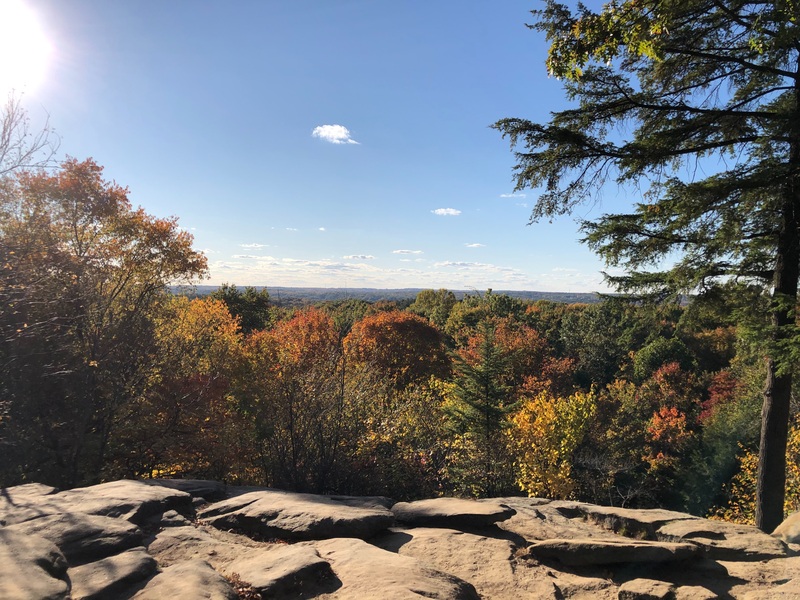 2021-01-31
2021-01-31Venturing Outside My Comfort Zone
I moved to Ohio shortly before the pandemic hit, and quickly felt both trapped and lost when stay-at-home orders went into effect. I did not have enough time in the state to learn my way around, and actually grew somewhat agoraphobic, convinced something bad was going to happen if I left my neighborhood, which was the only place I felt familiar with. Throughout the entire summer, I rarely left the ten-mile radius around my house. As the summer ended and I recognized how fearful my life had become, I reached out to a therapist and began meeting with her virtually every couple of weeks. She encouraged me to venture out in the safest way I could, exploring the nature around me and getting more comfortable in Ohio. Autumn came and I chose one park a week, going on short walks and hikes, and I fell in love with the colors Ohio offers in the fall. Pictured here is one of my favorite adventures I’ve been on, Cuyahoga Valley National Park outside of Cleveland, where I got to see the most gorgeous fall colors. While the world is still frightening at the moment and we still have to be safe in public spaces, I was able to feel more at home here by connecting to nature. -
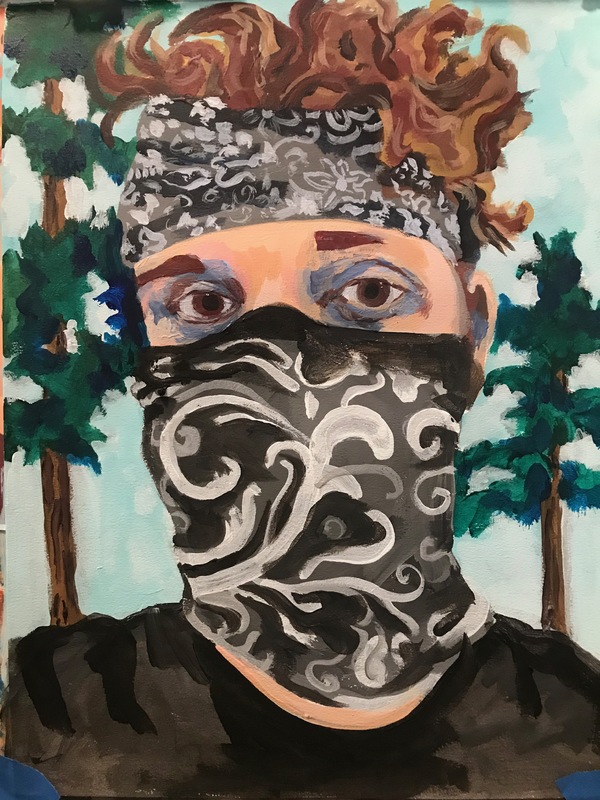 2020-04
2020-04Covid Portraits: Allston
I decided to do a series of portraits of family members in masks to document the pandemic. -
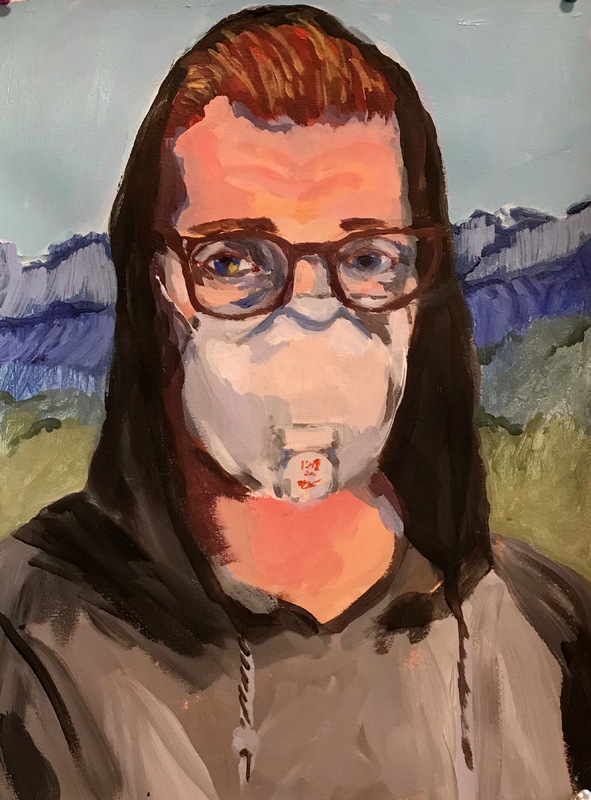 2020-04
2020-04Covid Portraits: Los Angeles
I decided to do a series of portraits of family members in masks to document the pandemic. -
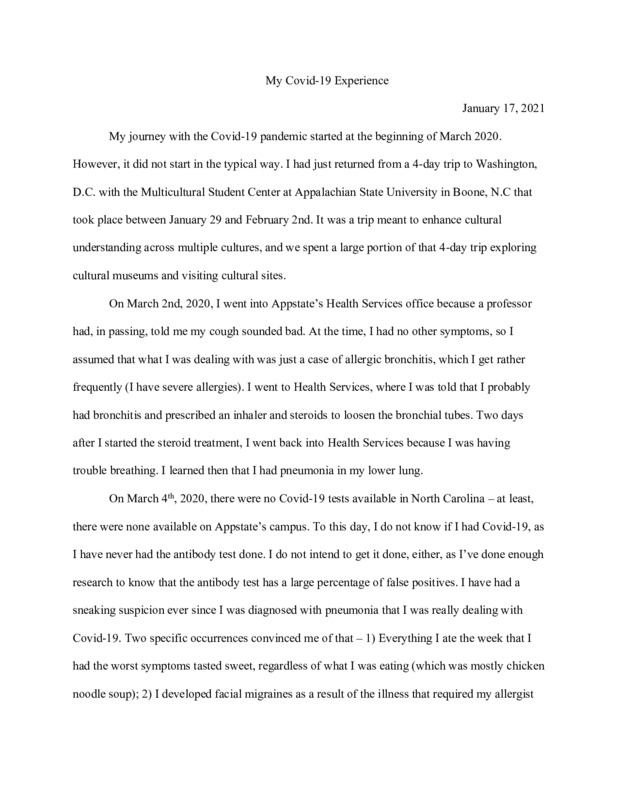 2021-01-17
2021-01-17My Covid-19 Experience
The essay I've submitted demonstrates the societal issues that the pandemic has helped to unmask as well as serving as a personal documentation of my own journey. -
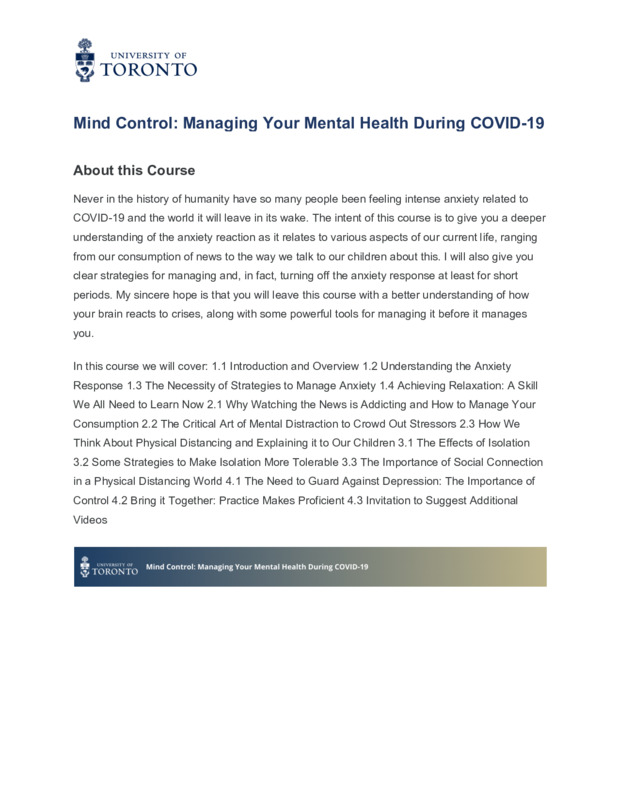 2020
2020Mind Control: Managing Your Mental Health During COVID-19
The University of Toronto has developed a free course entitled Mind Control: Managing Your Mental Health During COVID-19, in order to equip Canadians with tools to manage our mental health, before it manages you. The course is designed to teach students about anxiety as it presents itself throughout our daily life, from the consumption of news, to the way it is discussed with our children. Understanding how our brains react to crises, students would be more prepared to manage their own mental health. -
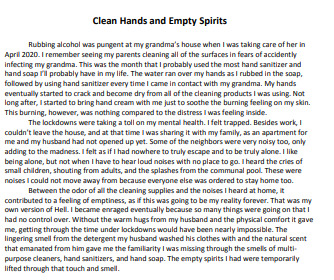 2020-12-09T17:33
2020-12-09T17:33First Year of Marriage and the Pandemic
I got married on May 11, 2019. There were no masks and no need to distance from each other. In July 2019, I got my first job working for my grandma as her caretaker. Since I had graduated ASU, I didn't have much going on, and I needed some way to occupy myself, as well as make money. I did things such as picking the oranges that would fall from the trees in her backyard and trash them so the area would look nicer. I cooked, I cleaned, and I assisted her in computer tasks that she didn't understand how to do. In December of 2019, my grandma had a few unfortunate things happen to her. First, she got pneumonia and had to be taken to the emergency room. She survived, but was weak. Later on, she ended up falling, and was then taken to a care center so that she could regain her strength and do physical therapy. When my grandma came back from the care center in January, I had a new job. Learning from what the physical therapist taught me, I used the exercise recommendations for her and helped her walk better again. It was no easy task, as my grandma can be quite stubborn, but luckily, she was willing to take direction from me in order to move around easier. We have been doing the physical therapy as part of her daily routine ever since. Due to my grandma's worsening condition, my mom and dad decided to move to my grandma's house in January, leaving the apartment mostly to me and my husband. This change was greatly welcomed, and it felt like we could experience married life without my family intervening nearly as much. Overall, January was a pretty good month for me and my husband. One of the biggest events that happened to me before the virus was the death of one of my cousins. On February 11, 2020, he commit suicide. It was a jarring experience. He had lived nearby with his wife and kid and helped install new electrical outlets in the apartment me and my husband were sharing with my parents until a new apartment opened in that same complex. Despite this, we were able to have a normal funeral, which was nice since it gave me some closure. I mostly felt bad for his wife and kid he left behind, since they would now have to figure out how to continue without him. By the time February hit, I was well aware of the virus by this time, but I was sure that majority of the problem was in China. Earlier that month, I had gone to the Dominican Republic to do some volunteer work, as I knew how to speak Spanish. I noticed travel restrictions to and from China at that time, and thought that the travel restrictions could help. This is why I mostly thought the pandemic was mostly China's problem. This idea was quickly changed when March hit. When March 2020 hit and there was a declaration of national emergency, I was very stressed by it. I kept on having images flash in my head of empty grocery aisles that I've seen from social media. Due to the panic that had occurred over the national emergency declaration, the grocery store in my area was completely out of eggs, toilet paper, and hand sanitizer, and the meat aisle was nearly emptied. There were rations on the amount of canned goods you could get. Me and my husband were able to grab a few, some of which my husband said were the "good ones that no one wanted". After that, my anxiety lessened and I felt like I could handle it. I was wrong, as I was not expecting full lockdowns later that month. By the time April came along, the lockdowns felt so severe to me that I couldn't escape anywhere. Bedsides my husband having to comfort me, one of the only things keeping me sane was the job of working for my grandma. I became even more thankful for that job since had I gotten a job in the service industry, or even a basic office job, I would have likely been let go due to being too new. Additionally, I was working full-time for a while, so money wasn't as much of an issue for me as it was before I had gotten the job. April was also when I had one of my worst anxiety attacks, and so to help me, my husband took me out to get some fast food and eat in a parking lot in order to not feel so enclosed. March felt similar to April. The big difference here though was that my brother had to come back from his LDS Church mission six months earlier due to the pandemic, so we ended up having someone new to live with when he got back. One of the nice things my family did, since church services were changed due to the virus, was having by brother bless the sacrament, as he had the authority to do so. By dressing for church and having it at my grandma's home, I was able to feel a bit more normal again, which helped me reduce my anxiety. When May hit, it was me and my husband's one year anniversary. For this special occasion, I booked an Italian restaurant and were able to dine-in for the first time in months. As more places started to open up, I felt my anxiety decrease, as I knew I could enjoy more things again. I am now writing this all in December 2020. The endless monotony of living without as many places to go has made this year feel like both the longest and shortest year that I have experienced. I know that things will change and things will go back to normal, and that is one of the things that is keeping me happy. My anxiety is the worst it has ever been this year due to the restrictions on everyday life, but I've learned that I can live through it, with the help of my husband. This was a trying year for many people's marriages, and to have this experience within the first year of marriage has made me realize how much I depend on my husband, but also that we can get through many tough things together. -
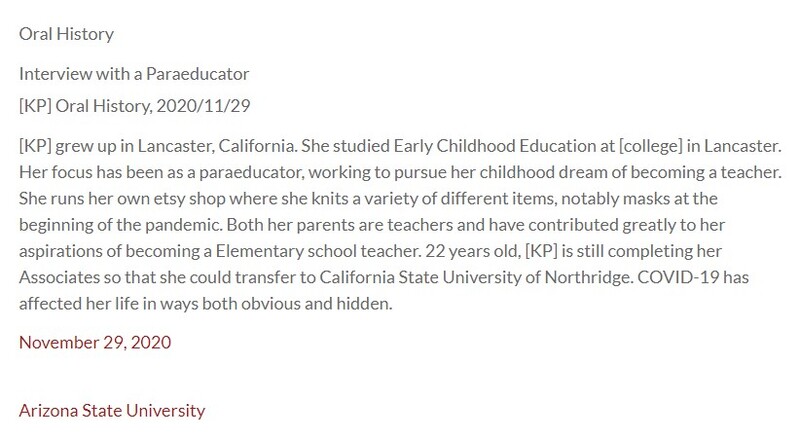 2020-11-29
2020-11-29Interview with a Paraeducator
The contributor of this item did not include verbal or written consent. We attempted to contact contributor (or interviewee if possible) to get consent, but got no response or had incomplete contact information. We can not allow this interview to be listened to without consent but felt the metadata is important. The recording and transcript are retained by the archive and not public. Should you wish to listen to audio file reach out to the archive and we will attempt to get consent. -
2020-12-01
I've Taken the COVID-19 Test Twice in as Many Months
I have always gotten sick during the fall semester; it's just how my immune system has always been with my allergies and all of the normal sicknesses that go around this time of year. This year the fall semester and my normal sicknesses during it have been a source of stress for me on top of my classes. I am currently attending Florida Gulf Coast University and we have to fill out a daily health screening app that puts case investigators in contact with us if we report any symptom that might be related to COVID-19. This semester I have been in contact with case investigators twice. The first time was sometime around October 26 when I got my first COVID-19 test. I had a cough, a sore throat, and was experiencing fatigue but no fever. Just to be sure, I scheduled a test at a local CVS. The test at CVS you have to administer yourself and was unpleasant to say the least. My results came back negative on October 29, I told my case investigator, and returned to class. I missed my zoom class that Monday as well as my on-campus class that Tuesday. The following month, I developed a fever that reached 103.8 at its highest but I had no other symptoms except a cough after my fever passed. I tested on November 17 at another local CVS. It was the same self-administered test. I attended my class the Monday before, my temperature during which was between 102.8 and 103. I missed my class that Tuesday and got my results on November 20. It was once again negative, and I was able to return to my on-campus classes once my cough stopped. Like many other students, this pandemic has interrupted my normal school life and has added stress to an already stressful semester. In addition to this, not being able to attend class while I was waiting on my test results like has impacted my grades though I would not have attended those classes anyway if I were allowed to while waiting on my results.
